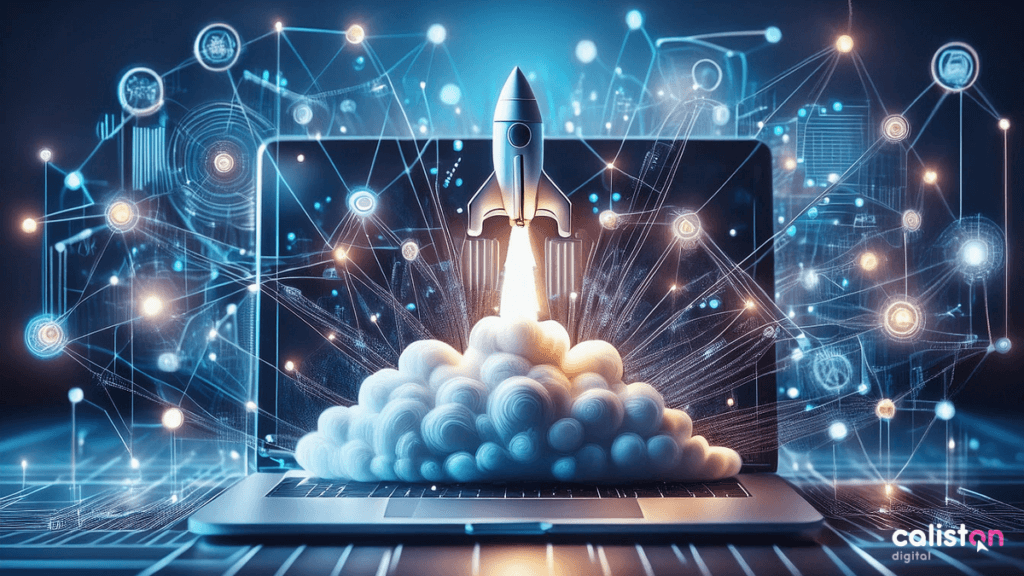
AI-driven marketing is revolutionising how businesses interact with their audiences, streamline operations, and enhance decision-making processes. In 2024, several key trends are shaping this landscape, enabling companies to deliver more personalised, efficient, and impactful marketing strategies. This article delves into these trends, exploring the transformative power of AI in modern marketing.
Generative AI: Crafting Content with Precision
Generative AI tools like ChatGPT are at the forefront of marketing innovation, allowing for the creation of high-quality content, including text, visuals, and videos, based on specific prompts. This technology enables marketers to produce personalised content more efficiently, meeting the increasing demand for tailored customer experiences.
By automating content generation, businesses can maintain a consistent output of engaging materials, from social media posts to comprehensive marketing campaigns. The ability to generate contextually relevant content quickly not only saves time but also ensures that marketing efforts remain aligned with the latest trends and audience preferences.
AI for Personalisation: Enhancing Customer Engagement
AI is instrumental in refining personalisation strategies by analysing vast amounts of audience data. This includes behavioural, demographic, and transactional information, which helps marketers create more relevant and engaging customer experiences. Hyper-personalisation, a trend driven by AI, allows businesses to deliver highly tailored content and offers to individual customers, significantly boosting engagement and conversion rates.
Predictive analytics further enhances this capability by forecasting future customer behaviours. By analysing historical data, AI can predict which products or services a customer is likely to be interested in, allowing for more targeted marketing efforts. This data-driven approach ensures that marketing resources are utilised effectively, maximising return on investment (ROI).
AI-Powered Chatbots Revolutionising Interaction
The sophistication of AI-driven chatbots has reached new heights, making them capable of handling complex customer inquiries and providing personalised assistance around the clock. These chatbots improve customer satisfaction by offering immediate responses and guiding users through various stages of the sales funnel.
Conversational AI extends the functionality of chatbots by supporting both inbound and outbound communications. This includes managing customer inquiries through web contact forms and executing promotional email campaigns. By automating these interactions, businesses can maintain a high level of customer engagement without overwhelming their human support teams.
Predictive Analytics: Data-Driven Decision Making

Predictive analytics is a powerful AI application that analyses customer data to predict future behaviours and trends. This capability enables marketers to make informed decisions and optimise their strategies based on anticipated outcomes. For instance, predictive models can forecast sales trends, identify high-potential leads, and recommend the most effective marketing channels and messages.
By leveraging predictive analytics, businesses can stay ahead of market trends, respond proactively to customer needs, and allocate their marketing resources more efficiently. This data-driven approach ensures that marketing efforts are both strategic and impactful.
Voice-Based Shopping: The Next Frontier
As voice search and shopping continue to gain popularity, marketers are increasingly focusing on optimising content for the voice-search experience. AI technology enables the creation of content that aligns with the natural language used in voice queries, making it easier for customers to find and interact with brands through voice-activated devices.
Voice-based shopping represents a significant shift in consumer behaviour, and businesses that adapt to this trend will be well-positioned to capture a growing segment of the market. By integrating voice search optimisation into their marketing strategies, companies can enhance their visibility and accessibility, driving higher engagement and sales.
Multimodal AI: Integrating Text and Visuals
Multimodal AI systems, which can generate content and visuals simultaneously, are becoming increasingly sophisticated. This technology allows marketers to produce higher volumes of personalised content more efficiently, combining text, images, and videos into cohesive marketing materials.
The integration of multimodal AI into marketing workflows enhances creativity and innovation, enabling businesses to deliver more compelling and diverse content. This approach not only improves the efficiency of content production but also ensures that marketing messages are visually engaging and contextually relevant.
Streamlining Processes
AI-driven marketing automation is transforming how businesses manage their marketing activities. By automating tasks such as ad targeting, content creation, and customer segmentation, AI improves both the efficiency and effectiveness of marketing campaigns. Automated systems can analyse vast amounts of data to identify trends, optimise marketing strategies, and execute campaigns with precision.
This automation allows marketing teams to focus on strategic initiatives and creative tasks, rather than being bogged down by repetitive processes. As a result, businesses can achieve greater scalability and responsiveness, staying competitive in a rapidly evolving market.
Popular AI Marketing Tools
1. Jasper.ai
Jasper.ai started as an AI writing tool but has expanded into a comprehensive marketing assistant. It helps with everything from content creation to SEO and social media marketing. Jasper offers over 50 templates for generating high-converting content across various platforms, making it invaluable for marketers looking to streamline their content production.
2. Surfer SEO
Surfer SEO is a powerful tool for enhancing the quality of web content to achieve higher search engine rankings. It analyses SERPs and provides recommendations for optimizing content, including keyword suggestions and content structure improvements. This tool is particularly useful for agencies and brands focused on SEO.
3. Grammarly
Grammarly is widely used for refining written communication. Its AI-driven suggestions ensure error-free and engaging content, which is essential for maintaining professional and brand-specific communication. GrammarlyGO, a generative AI feature, enhances writing based on context and goals, supporting platforms like Google Docs and Gmail.
4. Toasty AI
Toasty.AI is an innovative AI-driven platform designed to enhance customer engagement through advanced conversational interfaces. Its primary functionality includes managing customer data, automating personalised interactions, and improving customer support efficiency.
5. Flick
Flick is an AI-powered social media marketing assistant that helps users generate content ideas, personalised captions, and post scheduling. It also offers analytics to track performance and compare posts, making it a great tool for small businesses and social media managers.
Embracing the Future of Marketing
The rapid advancements in AI-driven marketing are reshaping the landscape of digital engagement. From generative AI and hyper-personalisation to advanced chatbots and predictive analytics, these technologies are enabling businesses to connect with their audiences in more meaningful and efficient ways. As AI continues to evolve, its integration into marketing strategies will become increasingly essential, offering new opportunities for innovation and growth.
By staying informed about these trends and adopting AI-driven solutions, businesses can enhance their marketing efforts, deliver exceptional customer experiences, and achieve their strategic objectives in an ever-changing digital world.






Follow Us